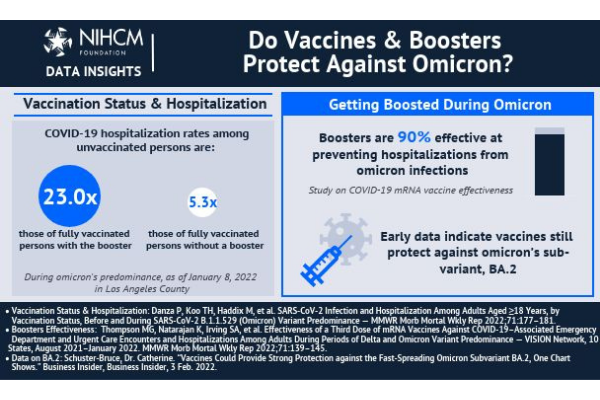
Highlighting the effectiveness of COVID-19 booster shots – including their overwhelming effectiveness at preventing hospitalization and death – the National Institute for Health Care Management (NIHCM) Foundation has collected a slew of COVID-related data from other sources in its February newsletter, Cutting Through COVID-19 Confusion.
The NIHCM newsletter, with an accompanying data visualization (above), includes a Q&A on frequent questions about COVID, boosters, and the omicron variant, as well as information on the pandemic’s effect on children and its impact on behavioral health and substance use disorders.
Among the notes in the newsletter, which include links to relevant studies:
- Boosters are 90% effective at preventing hospitalizations due to infection with the omicron variant;
- Compared with the unvaccinated, people with boosters are 97 times less likely to die of COVID-19.
- Hospitalization rates among the unvaccinated are 23 times higher than those of people who have boosted, and 5.3 times higher than those of people vaccinated but not boosted.
- The BA.2 subvariant of omicron has been detected in most U.S. states. While it hasn’t been found thus far to cause greater disease severity, one study in Denmark found that BA.2 is 33% more likely to infect people than the “original” omicron variant.
- COVID-19 cases among children surpassed 1 million in January, “nearly five times the rate at the peak of last winter’s surge.”
- The latest surge in omicron has led to more pediatric hospitalizations and a rise in multisystem inflammatory syndrome in children (MIS-C), which recent studies have found will affect one out of every 1,000 pediatric cases.
Continue reading Texas Medicine Today for more up-to-date news on COVID-19, and visit TMA’s COVID-19 Resources page.
Last Updated On
April 05, 2022
Originally Published On
February 11, 2022